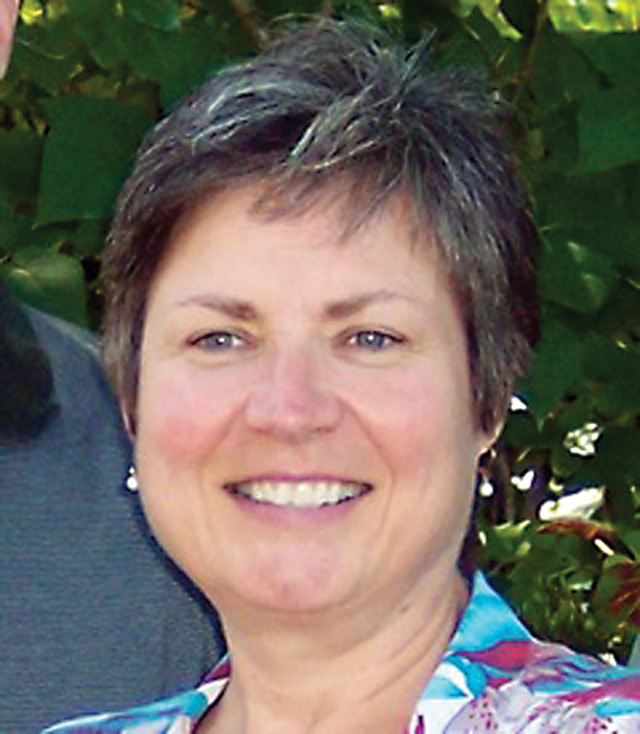Organizing for social change
Bringing groups into relationship, working together for a better world for all
By Sr. Judy Donovan, C.S.J.
March/April 2012
Return to Table of Contents
Print Article
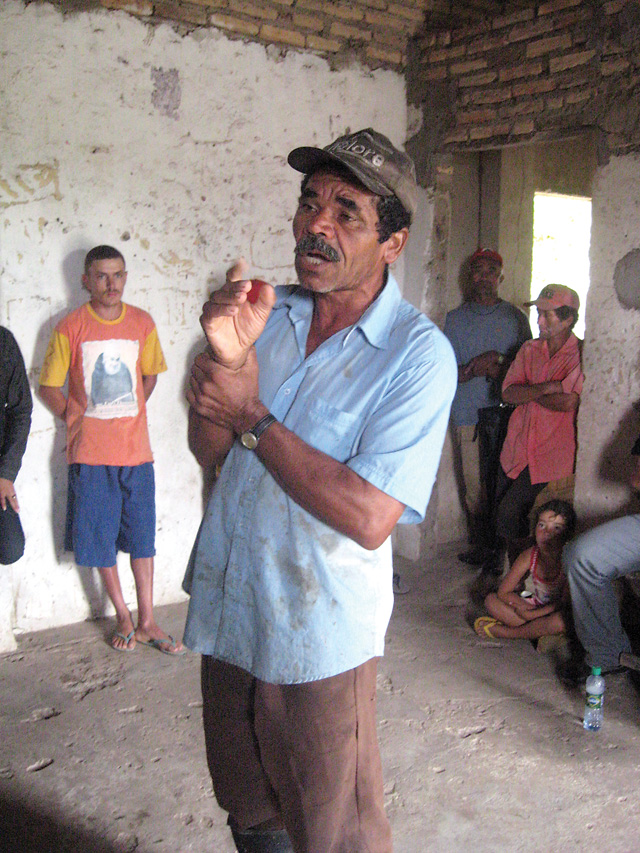 João da Silva of the Fazenda Jabuticaba landless community in Northeast Brazil, speaks of the community’s struggle to gain title to land. Today, large landowners in Brazil continue to evict small farmers from lands that are now slated for export crops. Without their livelihood, rural families are forced to the urban slums in a mostly hopeless search for work and where drugs and crime threaten their youth.
João da Silva of the Fazenda Jabuticaba landless community in Northeast Brazil, speaks of the community’s struggle to gain title to land. Today, large landowners in Brazil continue to evict small farmers from lands that are now slated for export crops. Without their livelihood, rural families are forced to the urban slums in a mostly hopeless search for work and where drugs and crime threaten their youth.
It started in Brazil, my first mission call after making my first vows 26 years ago. For six years I worked with Brazilian sisters and laity in largely priestless areas of the impoverished Northeast. We formed Base Christian Communities as well as schools of biblical literacy, and taught alternative agriculture and micro-enterprise. I planned to return North one day to continue my education, perhaps becoming a therapist.
That all changed one night when I found myself walking down a dark dirt road in our small town, being led to the local jail by an exhausted young man who had run more than 12 kilometres to fetch me.
Ten days earlier our pastoral team had visited his village where we reflected on John 10:10, “I have come that you may have life and have it to the full.” As we walked to the jail, the young man told me what had happened after we left his village. Don Carlos, patriarch of the group of sharecroppers, gathered his community and they decided to put God’s Word into action. They approached their landlord, “a good Catholic,” and explained that they couldn’t feed their families on the allowed rations of rice, but if they could keep more rice per family, the young people would not leave for the big cities where they often fell into vice or were not heard from again. The landlord listened carefully and dismissed them. The next day he sent his goons to confiscate their livestock, burn their fields, and throw Don Carlos and his family in jail.
A crisis of faith
On the road that night I had a crisis of faith. These good people actually took Jesus’ words seriously and tried to act on them. Was I shocked that they took action? Didn’t I believe the Good News? They naively thought their landlord would help, but I guess I naively thought they wouldn’t take Jesus (or us) seriously. We had not prepared them to face such brutal power. What had we done?
What took place next were my first experiences of the power of faith in action. Churches, unions and cooperatives held meetings and formed alliances. Public pressure was created. Eventually, not only did the police release Don Carlos’s family, but regional land reforms followed.
Organizers try to help people of faith to “occupy” not just Wall Street, but their congregations, neighbourhoods, cities and polling stations so that through their faithful action in the world there may indeed be more “life, and life to the full.”
The family’s ordeal took place over Lent. When they finally emerged from jail, Don Carlos shared a poem he had created, “Cast aside into the dark like worthless scrap wood, I dried out and was left for dead. Then slowly, shoots began to sprout, watered with the cries and tears from my brothers. These cries grew and brought me back to life.” It was Good Friday.
With this experience, my professional call began to change. Instead of working in the field of personal change, I felt called to be an agent of institutional change. I wanted to learn how to put Jesus’ words into action so that I would never again lead innocents into further oppression, but rather into greater freedom.
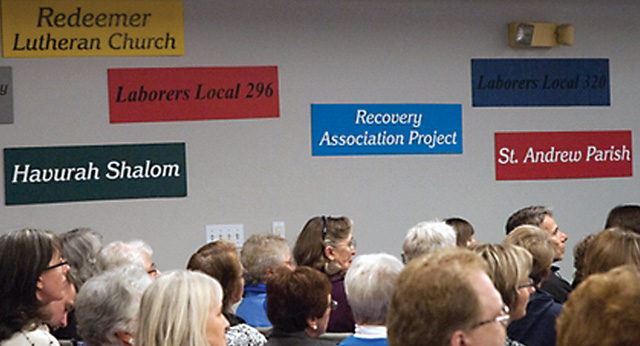
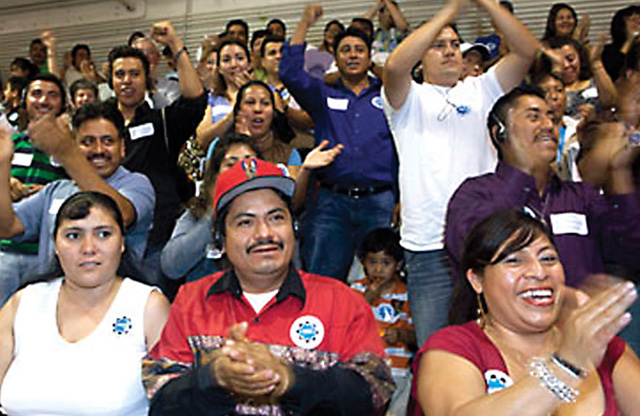
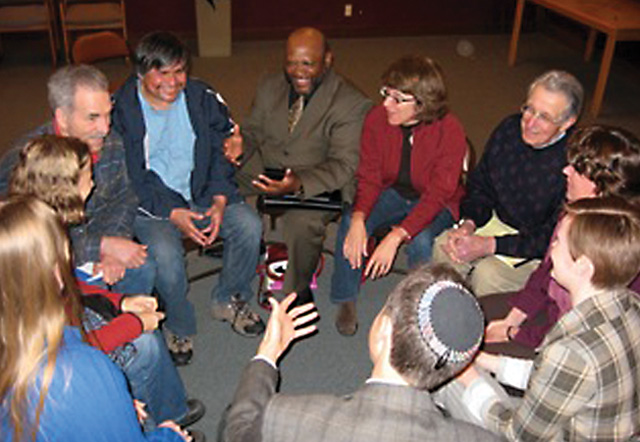 As an interfaith community organizer with the Industrial Areas Foundation, Sister Judy Donovan lives her congregation’s charism by working with faith communities and civic society in northern California to create change on issues affecting their communities. To find out more about the
As an interfaith community organizer with the Industrial Areas Foundation, Sister Judy Donovan lives her congregation’s charism by working with faith communities and civic society in northern California to create change on issues affecting their communities. To find out more about the Industrial Areas Foundation, visit www.industrialareasfoundation.org.
Two years later in graduate school in the US I read about an organization that for 60 years had taken the power of faith communities seriously. Founded in the industrial area of the poor, immigrant, south-side of Chicago, it called itself the Industrial Areas Foundation. Today the IAF is the oldest and largest leadership development and congregational organizing effort with affiliates across the US, Canada, Australia and England. (One alumni, President Obama, was famously ridiculed for his past profession by opponents while campaigning for office.)
I have now organized with the IAF for 16 years along the Texas/Mexico border, in Los Angeles, and today in northern California where I supervise a staff of Christians, Jews, Buddhists and Quakers working in 11 counties.
Just what do organizers do? We teach/re-teach congregations their own social traditions (what they believe about their mission in the world). We create relationships across interfaith lines to build trust and share concerns. We engage congregations in research, analysis and democratic action. We evaluate and reflect on how acting together helps strengthen their congregation and mission.
As an interfaith community organizer, my schedule each week might include arranging a meeting between Latino leaders and the police chief regarding racial profiling; training Muslim students in combating cam-pus Islamophobia; attending an interfaith clergy lunch to plan a summit on youth gang violence; or making a presentation at a synagogue about establishing a homeless shelter.
Developing leadership
Organizing has led to millions of dollars being invested into poor communities in infrastructure, safety, education, health care and jobs as well as changes to unjust public policies. But most important, organizing develops the leadership of people like Ninfa Garza. Mrs. Garza was too shy to even introduce herself when we first met. After getting involved through her parish, this formerly abused wife, now single mother, was able to confront the local police chief about their treatment of her sons and their friends just because they were Latinos. This emboldened other mothers to come forward. Together they hosted education sessions with the police, educating them about the immigrant community. Mrs. Garza was forever changed.
What does this work have to do with my charism as a Sister of St. Joseph? Like most religious, I don’t so much have a charism as much as the charism has me. Nearly every day I have to overcome my own isola-tion and self-interest in order to live our charism—to be an agent of “the union of neighbour with neighbour and neighbour with God.” When we bring differing groups into relationship so that they can act on their faith together I feel like I am seeing that unity incarnate.
So much is at stake. With the world’s youth raging about seeing their hope of a secure future dashed on the altar of corrupt money and politics, organizers try to help people of faith to “occupy” not just Wall Street, but their congregations, neighbourhoods, cities and polling stations so that through their faithful action in the world there may indeed be more “life, and life to the full.”
Return to Table of Contents
Print Article
